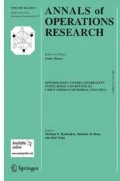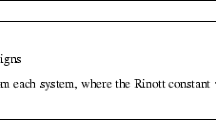Abstract
A simulation optimization framework containing three fundamental stages (feasibility check, screening, and selection) is proposed for solving the zero-one optimization via simulation problem in the presence of a single stochastic constraint. We present three rapid screening algorithms that combine these three stages in different manners, such that various sampling mechanisms are applied, therefore yielding different statistical guarantees. An empirical evaluation for the efficiency comparison between the proposed algorithms and other existing works is provided.



Similar content being viewed by others
References
Amaran, S., Sahinidis, N. V., Sharda, B., & Bury, S. J. (2016). Simulation optimization: A review of algorithms and applications. Annals of Operations Research, 240, 351–380.
Andradóttir, S., & Kim, S. H. (2010). Fully sequential procedures for comparing constrained systems via simulation. Naval Research Logistics, 57, 403–421.
Atlason, J., Epelman, M. A., & Henderson, S. G. (2004). Call center staffing with simulation and cutting plane methods. Annals of Operations Research, 127, 333–358.
Barahona, F., Jünger, M., & Reinelt, G. (1989). Experiments in quadratic 0–1 programming. Mathematical Programming, 44, 127–137.
Batur, D., & Kim, S. H. (2010). Finding feasible systems in the presence of constraints on multiple performance measures. ACM Transactions on Modeling and Computer Simulation, 20, 1–26.
Boesel, J., Nelson, B. L., & Kim, S. H. (2003). Using ranking and selection to “clean up” after simulation optimization. Operations Research, 51, 814–825.
Branke, J., Chick, S. E., & Schmidt, C. (2007). Selecting a selection procedure. Management Science, 53, 1916–1932.
Chen, E. J. (2011). A revisit of two-stage selection procedures. European Journal of Operational Research, 210, 281–286.
Ho, Y. C., Cassandras, C. G., Chen, C. H., & Dai, L. (2000). Ordinal optimisation and simulation. Journal of the Operational Research Society, 51, 490–500.
Kim, S. H., & Nelson, B. L. (2001). A fully sequential procedure for indifference-zone selection in simulation. ACM Transactions on Modeling and Computer Simulation, 11, 251–273.
Kosuch, S., & Lisser, A. (2010). Upper bounds for the 0–1 stochastic knapsack problem and a branch and bound algorithm. Annals of Operations Research, 176, 77–93.
Lee, L. H., Pujowidianto, N. A., Li, L. W., Chen, C. H., & Yap, C. M. (2012). Approximate simulation budget allocation for selecting the best design in the presence of stochastic constraints. IEEE Transactions on Automatic Control, 57, 2940–2945.
Nelson, B. L., & Goldsman, D. (2001). Comparison with a standard in simulation experiments. Management Science, 47, 449–463.
Nelson, B. L., Swann, J., Goldsman, D., & Song, W. (2001). Simple procedures for selecting the best simulated system when the number of alternatives is large. Operations Research, 49, 950–963.
Park, C., & Kim, S. H. (2015). Penalty function with memory for discrete optimization via simulation with stochastic constraints. Operations Research, 63, 1195–1212.
Pichitlamken, J., Nelson, B. L., & Hong, L. J. (2006). A sequential procedure for neighborhood selection-of-the-best in optimization via simulation. European Journal of Operational Research, 173, 283–298.
Rinott, Y. (1978). On two-stage selection procedures and related probability-inequalities. Communications in Statistics—Theory and Methods, A7, 799–811.
Tsai, S. C. (2013). Rapid screening procedures for zero-one optimization via simulation. Informs Journal on Computing, 25, 317–331.
Tsai, S. C., & Chu, I. H. (2012). Controlled multistage selection procedures for comparison with a standard. European Journal of Operational Research, 223, 709–721.
Tsai, S. C., & Kuo, C. H. (2012). Screening and selection procedures with control variates and correlation induction techniques. Naval Research Logistics, 59, 340–361.
Udías, A., Efremov, R., Galbiati, L., & Cañamón, I. (2014). Simulation and multicriteria optimization modeling approach for regional water restoration management. Annals of Operations Research, 219, 123–140.
Williams, P., Guangfu, T., & Yiming, L. (2010). Simulation based analysis of patient arrival to health care systems and evaluation of an operations improvement scheme. Annals of Operations Research, 178, 263–279.
Author information
Authors and Affiliations
Corresponding author
Electronic supplementary material
Below is the link to the electronic supplementary material.
Rights and permissions
About this article
Cite this article
Tsai, S.C., Yang, T. Rapid screening algorithms for stochastically constrained problems. Ann Oper Res 254, 425–447 (2017). https://doi.org/10.1007/s10479-017-2459-6
Published:
Issue Date:
DOI: https://doi.org/10.1007/s10479-017-2459-6



